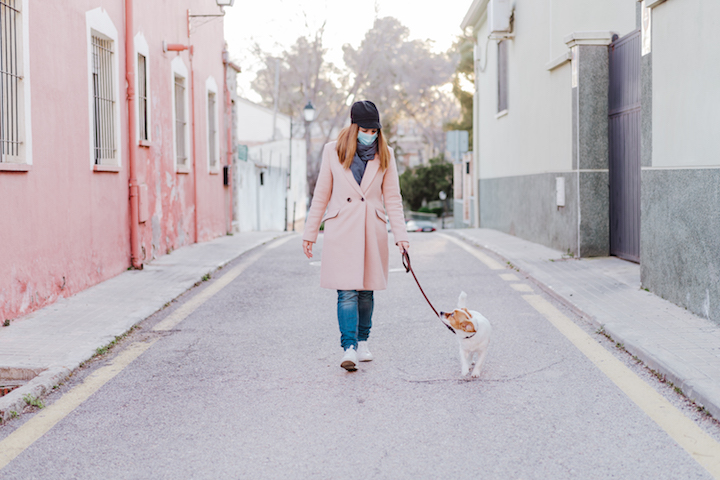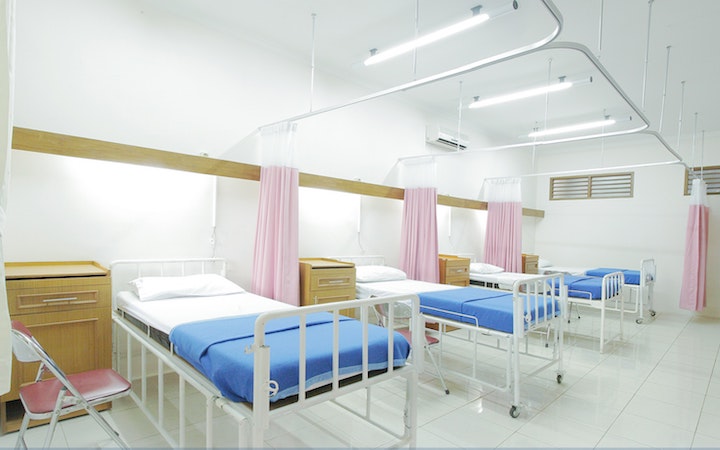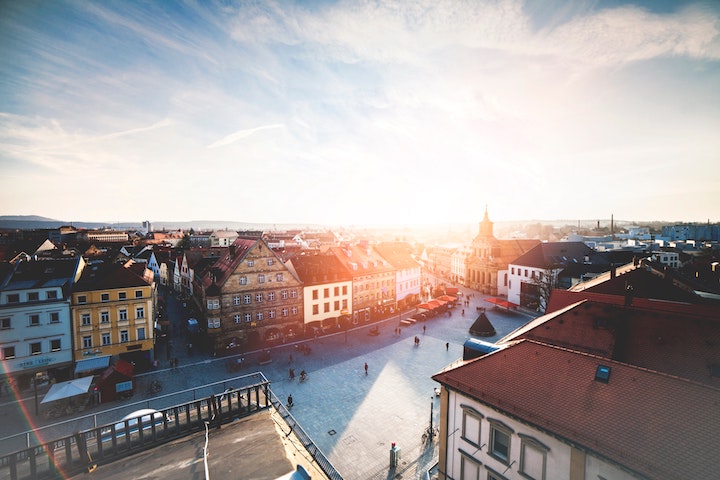The one silver lining of this pandemic: It’s bringing us closer together as we share stories and experiences we can all relate to. What it’s like in Germany during the pandemic.
In 2009, when I was a PhD student in New Zealand, I contracted swine flu. Back then, at the age of 30 (which seems incredibly young to my now 41-year-old self!), it all felt kind of surreal, given that the symptoms aren’t really that different from your regular old flu. I remember dragging myself to the student medical center expecting to just have an unusually severe cold. But after one look at my miserable, coughing self, a nurse instantly handed me a mask and ushered me into a separate room filled with other mask-wearing, miserable-looking students.
I was asked to do the swab test for the H1N1 virus and, after a short consultation with a doctor, was sent back home with the usual suggestions when it comes to dealing with any virus: “Lots of rest, plenty of fluids, pain medication for the intense headache, chest pain, and high fever, and, ya know — just ride it out!” Off I went back to bed, where I spent almost three weeks in absolute misery. The chills, the extreme fatigue, and of course the awful, intensely persistent cough I dealt with were just on another level compared to other flu experiences I’d been through.
And yet, mere weeks after my recovery, I treated the whole episode as more of a crazy anecdote to tell my friends and family: ”Guess what, guys — I actually had swine flu! Isn’t that bizarre? I had that freak virus everyone was talking about. Weird, huh?”
Because the thing back then was: Hardly anyone else I knew caught this particular virus. The media was talking about it, of course, but it felt so removed, so contained. Of course I am not trying to downplay the horrible results of the 2009 H1N1 pandemic, and I am thankful that I got through it safely. But the 2009 pandemic just did not feel like it was such a big deal to most people. The world seemed to bounce back to its normal self pretty quickly.

Fast forward to 2020, and everything is so surreally different. I still, as of now, do not have anyone near and dear to me who has been infected with COVID-19, thank God, but the threat of it happening is just so much more palpable, so much more terrifying. I live in Germany, so right in the middle of Europe, where the virus has hit and spread disastrously fast. In Italy, one of our neighboring countries, the death toll has surpassed that of China, and my heart bleeds for those affected.
I nevertheless feel safer here in Germany than I would anywhere else in the world. Yes, the number of infected is rising astronomically high, and it will keep rising. Right now, Germany has the fourth highest cases worldwide. And yes, I think that our government took way too long to finally decide on drastic measures to keep people away from each other. However, Germany also has a very low death rate so far, especially compared to countries like China, Italy, or Spain.
Part of this is our excellent healthcare system, which — despite some really bad decisions by our government to scale down the number of hospital staff and not pay them what they deserve — is still one of the best in the world. We have a high number of medical specialists per capita and are in the top three of the most intensive care beds per 1,000 citizens worldwide. So, if someone turns seriously ill, there is a much higher chance that this person will receive the care he or she needs than in many other countries.

And yet, we — just like everywhere else right now — are far from safe here in Germany. People were frighteningly careless in late February and early March, when the virus arrived in Europe and started spreading rapidly. I live in Freiburg, a city known for being “the sunniest in Germany” and a favorite tourist destination. Well, the sun was out in February and with it came throngs of people having picnics and huge BBQ parties outside.
Freiburg is an international university city, so students were out and about having fun. We also have a large population of elderly, and they, too, enjoyed the warm weather outside. Cafes, bars, and restaurants were chock full of people, and I myself was still planning to visit an indie beauty trade expo in Berlin by late March. I remember calling my sister and asking her, tentatively, if I should maybe cancel? I still really wanted to go though. God, how naïve we all were back then!
I started social distancing as soon as I realized how serious the whole thing was. To be absolutely honest, it isn’t that hard for me to do, since I work as a freelance writer and blogger from home and have little social contacts in Freiburg. Most of my friends live on the other side of the world, and my family is spread out all over Germany. The one thing I clung to in terms of “dangerous activities” until mid-March were my gym visits though. So, if I do get the virus, it will be because of that particular carelessness, no doubt!
The virus spread faster and faster in Germany, especially in the federal state of North Rhine-Westphalia, my home state and also where both my mother and one of my sisters live. Thanks to the annual carnival festivities in early February — particularly popular in the Cologne area, close to where I was born — infection numbers jumped up swiftly. Baden-Württemberg, the state where I currently live, also started to experience record numbers of infected. Freiburg is right next to the Alsace region, which was declared a critical region of the pandemic by the WHO, similar to Daegu in Korea and Wuhan in China.

Due to this, my city was the first one in the nation to issue a so-called Betretungsverbot, which roughly translates to “entry ban,” for all public spaces from March 23 onwards. It forbids gatherings of any kind in public spaces, and any groups larger than three were now forbidden to meet up. The federal state of Bavaria followed suit just a day later with its own social distancing rules, and only shortly thereafter Angela Merkel publicly spoke to the nation on TV — something she rarely does — to issue a full, nationwide near-lockdown.
Unlike Italy and Spain, we Germans are still allowed to go outside to exercise, as long as we do it in groups of two or as a family unit, and with at least 1.5 meters distance from others. Schools and universities are closed everywhere, as are all shops except supermarkets, pharmacies, and drugstores. Restaurants are still allowed to do delivery service. People can go to work, but work from home is encouraged as much as possible.
Going grocery shopping has become an utterly surreal, slightly absurdist chore now, with sealed off checkout desks and markers on the floor to make sure we keep to the regulated 1.5m distance. There is security pacing the aisles in most shops and guarding the doors to make sure the number of shoppers in the store remains small. At my favorite health food store, this means a broad-shouldered guy constantly crosses my path at an uncomfortably close distance as he circles the aisles, somewhat defeating the whole purpose of him being there.
I admire the supermarket and drugstore staff, who have to deal with insane hoarders ripping toilet paper packages out of their hands before they can even shelf them. What is the deal with toilet paper hoarding in my country? Can anyone explain it to me? Germany’s satire news site Postillon did a fantastic spoof article with “quarantine recipes” using toilet paper and pasta (the second most wanted item in the country at the moment — number three is flour, number four canned ravioli for some reason). People have also joked about the fact that here in Germany, we hoard toilet paper, while France sold out of condoms and red wine, and the Dutch panic-bought weed. Priorities, am I right?

I miss going to the gym, I miss someone shoving me at the supermarket checkout. As an introvert, I am fine with not seeing people face-to-face but get annoyed with extroverted people who claim that self-isolation is so much harder on them. Isolation is hard for all of us right now, just in different ways. I envy people with large gardens and cars, who can just drive away for a bit and go somewhere else. I envy people with boyfriends or families, while my friends with children say they envy me for being alone and at peace. My skincare routines, sheet masking, and my writing are what keep me sane these days, but man do I wish I had a cat (please send cat pics and gifs to my Instagram at any time, thank you)!
I am lucky in so many ways though and feel acutely aware of this incredible luck whenever I see what other countries go through. Germany has a well-oiled healthcare system that isn’t “free,” since it is based on insurance deducted from your income, but it is universally available for all, even the unemployed or poor (me being one of the poor). We have a welfare system in place that, again, has seen better and more socially responsible days, but it is there. Our chancellor has never been my personal choice, but I deeply respect her and feel so exceptionally glad that she is leading our nation through this crisis with her level-headed, no-nonsense approach. We have research groups working on a vaccine, and thankfully, it will not be bought up by some greedy nationalist or hyper capitalist, but available for everyone in the world once it is ready.
The self-distancing rules for public spaces will stay in effect until at least the end of April here in Germany. Most people, thankfully, are in support of the measures and seem to obey them. I have noticed so much more kindness towards supermarket employees these past weeks, so much more politeness from us notoriously rude and taciturn Germans. Wouldn’t it be wonderful if this warmth and gratitude towards those who are keeping us alive and well-fed through this pandemic will continue after this is all just a bizarre anecdote we will tell others? “Hey, remember that time we were all locked up indoors and this massive pandemic swept the world? Crazy, huh?”
Keep safe everyone — and stay connected! Let me know in the comments how your country is handling the pandemic right now, and what your personal experiences during this time have been!
Loading...